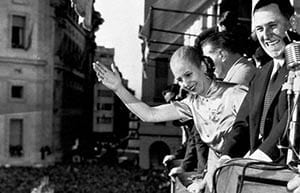When you hear the name Eva Perón, you may most likely recall Madonna singing the well-known song “Don’t Cry for Me Argentina”; the impact as the former first lady had on Argentina is anything but just a sentimental memory of a nostalgic past. Her legacy and most of all, what she stood for is still very much in the center stage of today’s political agenda.
Evita, as commonly called, was born Marìa Eva Duarte in the village Los Toldos to a humble family. She then moved to Buenos Aires when she was 15 in 1934 to pursue her dream of becoming an actress. In the beginning she struggled to find work since she had no formal education, and Argentina, like the rest of the world, was struggling economically after the Great Depression. She initially found work as a model and actress in plays and small movies, but eventually made her break when she landed a role in a popular radio program called Great Women in History. Eva’s career as an actress took off over the following years and by 1943 she was one of the highest paid radio actresses and also co-owned a radio station.
By the start of 1944, Eva became the mistress of Colonel Juan Perón, also the Secretary of Labor at that time. She took advantage of her fame and radio programming to produce a radio drama based on the works and achievements of Juan Perón.
The rising popularity, especially among the poor, of Juan Perón due to his exposure over the airwave had become a concern for the then government and those in power. Fearing that he might become too powerful, Perón was arrested and sent to prison. However, he had already garnered so much support by then from the working class that hundreds of thousands of people, including Eva, gathered in front of Casa Rosada demanding for his release. Touched by her loyalty, Juan Perón married Eva Durante in December 1945. At that time this was a highly unorthodox event because Eva was from a very humble beginning with no formal education and Peròn was a well respected Colonel in the army.
In 1946, Juan Peròn ran for President, Eva (now Perón) had again utilized her radio show to promote her husband´s campaign, in particular appealing to the poor. During the campaign Eva had toured across Argentina with her husband, and it was during this time period that she received her nickname Evita (meaning little Eva). Juan Perón had won by a landslide in that election.
As the First Lady, Evita became an advocate of the poor, setting up her own 

One of her greatest contributions was fighting for women’s rights, particularly in seeking the voting right for women. In 1947 Juan Perón signed the bill passing the law that gives women in Argentina the same political rights as men. Right after the signing, he handed it over to his wife, Evita, to symbolically acknowledge that it was also her law.
In 1951 Evita aimed to run for vice-president of Argentina. This move had caused a lot of criticism from the oppositions especially the military leaders, who had never accepted her new found status given her background and had despised her for her rising popularity among the people. In spite of this, her popularity continued to grow intensely and at a rally on Av. 9 de Julio two million people chanted her name supporting her to go for the vice-president candidacy.
In the end Evita opted not to run for vice-presidency as her health started to deteriorate. Evita was diagnosed with cervical cancer during a surgery that she underwent after having fainted in public in 1950. Despite having gone through the best treatments at that time, her health continued to worsen rapidly. On July 26, 1952, Eva Peròn died at the age of only 33. Even though she had never held political office, Evita received a state funeral and thousands of Argentines poured onto the street to express their mourning. The tomb of Evita is now a popular tourist attraction at the Recoleta cemetery, available for visit everyday.



